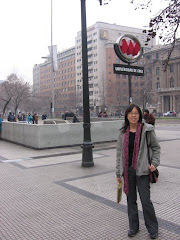Cost of living and who's really "rich"
Since leaving New York nearly two years ago, I've heard several offhand comments made by people from other parts of the country about how wealthy New Yorkers are, as if they're on a completely different level than ordinary Americans. This has left me scratching my head. Are they really?
After living in New York City for nearly ten years, four of them as a college student and the other six in publishing (an infamously low-paid industry), I got used to Craig's List rentals in pre-war buildings, walkups, trash, rats, and hauling groceries or laundry home on foot every week. I jostled through crowded sidewalks and subways filled with a mix of rich and poor people, but I would venture to say there were more poor.
New York has its glamour, it's true. You do see people wearing all-designer wardrobes, and power lunching at fancy restaurants, and making 5 or 6-figure bonuses.
However, even corporate lawyers are lucky to live in a decent-sized one-bedroom apartment (say 1200 sq. ft.) in Manhattan. And the highest paid work very hard; one first-year investment banker told me that if you divided his salary by the number of hours he was working, he was making a blue-collar hourly wage, which I have no doubt is true. I've often thought New York City is a place where the rich paradoxically live like the poor.
Meanwhile most of the people in my world – students, starving artists, low-level corporate drones – lived in sketchy neighborhoods, often with sketchy neighbors, and used recycled Ikea furniture in our closet-sized rooms. We ate at cheap ethnic dives and only saw Broadway shows with $20 lotteries. We couldn't afford to take cabs except in case of emergency. We didn't entertain much because we didn't have room, or lived too far out in the boroughs, or lived in a share with tenuous roommate relationships.
By contrast, so many people in Houston drive SUV's and live in big houses with huge flat-screen TV's that I can only assume this is attainable on a middle-class salary. How do you compare wealth when the cost of living is so different?
The conundrum has only gotten more interesting since coming back from Peru. On the one hand, the workaholic lifestyle and preoccupation with career in New York feels very divorced from the reality of billions who barely scrape by every day. On the other hand, the isolation afforded by the low cost of living (and good economy) in Texas, with each family comfortably ensconced in a big house with an entertainment system and a two-car garage, is just so... comfortable, so self-sufficient, which is the opposite of poverty too.
So I guess what I'm trying to say is, it's easy to look at someone else and say, "They have it so much better than I do." And assume that we're the only ones who are struggling. The truth is, if you live in America and make a middle-class salary or higher, you're pretty fortunate. No matter where you live.
And if you're laid off or otherwise hurting right now, you might want to consider moving somewhere with a lower cost of living.
SOOO Behind
14 years ago

3 comments:
Very interesting.
There was an article in the NY Times about that recently (http://www.nytimes.com/2009/02/08/fashion/08halfmill.html?em), specifically comparing New York and Houston actually, and more or less making some of the same points that you did. The most shocking thing was this statement: "But in New York, where a new study from the Center for an Urban Future, a nonprofit research group in Manhattan, estimates it takes $123,322 to enjoy the same middle-class life as someone earning $50,000 in Houston, extricating oneself from steep bills can be difficult."
Very interesting blog! Wandered over here while doing some research for what I hope will eventually be my own excursion to Peru, and will be back to keep reading up on what the real Peru looks like.
I've thought about this sort of thing before, being from the sticks and now finding life in the city to be, well, slightly more expensive. Another issue is the neglect of tax codes to regional differences in COL...
Post a Comment